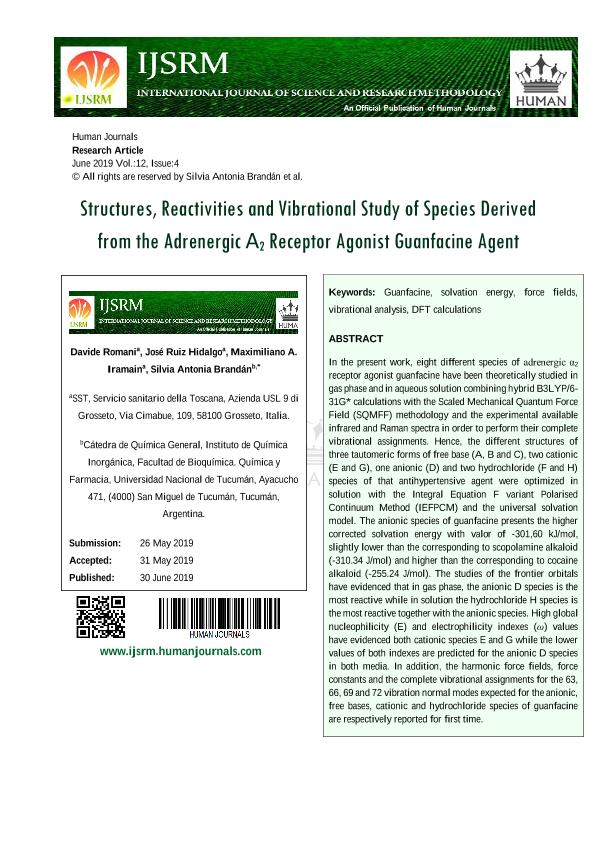Mostrar el registro sencillo del ítem
dc.contributor.author
Romani, Davide
dc.contributor.author
Ruiz Hidalgo, José

dc.contributor.author
Iramain, Maximiliano Alberto

dc.contributor.author
Brandan, Silvia Antonia

dc.date.available
2020-11-30T13:09:56Z
dc.date.issued
2019-06
dc.identifier.citation
Romani, Davide; Ruiz Hidalgo, José; Iramain, Maximiliano Alberto; Brandan, Silvia Antonia; Structures, Reactivities and Vibrational Study of Species Derived from the Adrenergic Α 2 Receptor Agonist Guanfacine Agent; IJSRM; International journal of science and research methodology; 12; 4; 6-2019; 1-25
dc.identifier.issn
2454-2008
dc.identifier.uri
http://hdl.handle.net/11336/119321
dc.description.abstract
In the present work, eight different species of adrenergic α 2 receptor agonist guanfacine have been theoretically studied in gas phase and in aqueous solution combining hybrid B3LYP/6- 31G* calculations with the Scaled Mechanical Quantum Force Field (SQMFF) methodology and the experimental available infrared and Raman spectra in order to perform their complete vibrational assignments. Hence, the different structures of three tautomeric forms of free base (A, B and C), two cationic (E and G), one anionic (D) and two hydrochloride (F and H) species of that antihypertensive agent were optimized in solution with the Integral Equation F variant Polarised Continuum Method (IEFPCM) and the universal solvation model. The anionic species of guanfacine presents the higher corrected solvation energy with valor of -301,60 kJ/mol, slightly lower than the corresponding to scopolamine alkaloid (-310.34 J/mol) and higher than the corresponding to cocaine alkaloid (-255.24 J/mol). The studies of the frontier orbitals have evidenced that in gas phase, the anionic D species is the most reactive while in solution the hydrochloride H species is the most reactive together with the anionic species. High global nucleophilicity (E) and electrophilicity indexes (ω) values have evidenced both cationic species E and G while the lower values of both indexes are predicted for the anionic D species in both media. In addition, the harmonic force fields, force constants and the complete vibrational assignments for the 63, 66, 69 and 72 vibration normal modes expected for the anionic, free bases, cationic and hydrochloride species of guanfacine are respectively reported for first time.
dc.format
application/pdf
dc.language.iso
eng
dc.publisher
IJSRM
dc.rights
info:eu-repo/semantics/openAccess
dc.rights.uri
https://creativecommons.org/licenses/by-nc-sa/2.5/ar/
dc.subject
REACTIVITY
dc.subject
GUANFACINE
dc.subject
HYPERTENSION
dc.subject
STRUCTURE
dc.subject.classification
Química Inorgánica y Nuclear

dc.subject.classification
Ciencias Químicas

dc.subject.classification
CIENCIAS NATURALES Y EXACTAS

dc.title
Structures, Reactivities and Vibrational Study of Species Derived from the Adrenergic Α 2 Receptor Agonist Guanfacine Agent
dc.type
info:eu-repo/semantics/article
dc.type
info:ar-repo/semantics/artículo
dc.type
info:eu-repo/semantics/publishedVersion
dc.date.updated
2020-11-18T16:39:36Z
dc.journal.volume
12
dc.journal.number
4
dc.journal.pagination
1-25
dc.journal.pais
India

dc.journal.ciudad
Maharashtra
dc.description.fil
Fil: Romani, Davide. Servicio Sanitario Della Toscana; Italia
dc.description.fil
Fil: Ruiz Hidalgo, José. Universidad Nacional de Tucuman. Facultad de Bioquimica, Quimica y Farmacia. Instituto de Quimica Inorganica. Cátedra de Química General.; Argentina. Consejo Nacional de Investigaciones Científicas y Técnicas. Centro Científico Tecnológico Conicet - Tucumán; Argentina
dc.description.fil
Fil: Iramain, Maximiliano Alberto. Universidad Nacional de Tucuman. Facultad de Bioquimica, Quimica y Farmacia. Instituto de Quimica Inorganica. Cátedra de Química General.; Argentina. Consejo Nacional de Investigaciones Científicas y Técnicas. Centro Científico Tecnológico Conicet - Tucumán; Argentina
dc.description.fil
Fil: Brandan, Silvia Antonia. Universidad Nacional de Tucuman. Facultad de Bioquimica, Quimica y Farmacia. Instituto de Quimica Inorganica. Cátedra de Química General.; Argentina
dc.journal.title
International journal of science and research methodology
Archivos asociados
